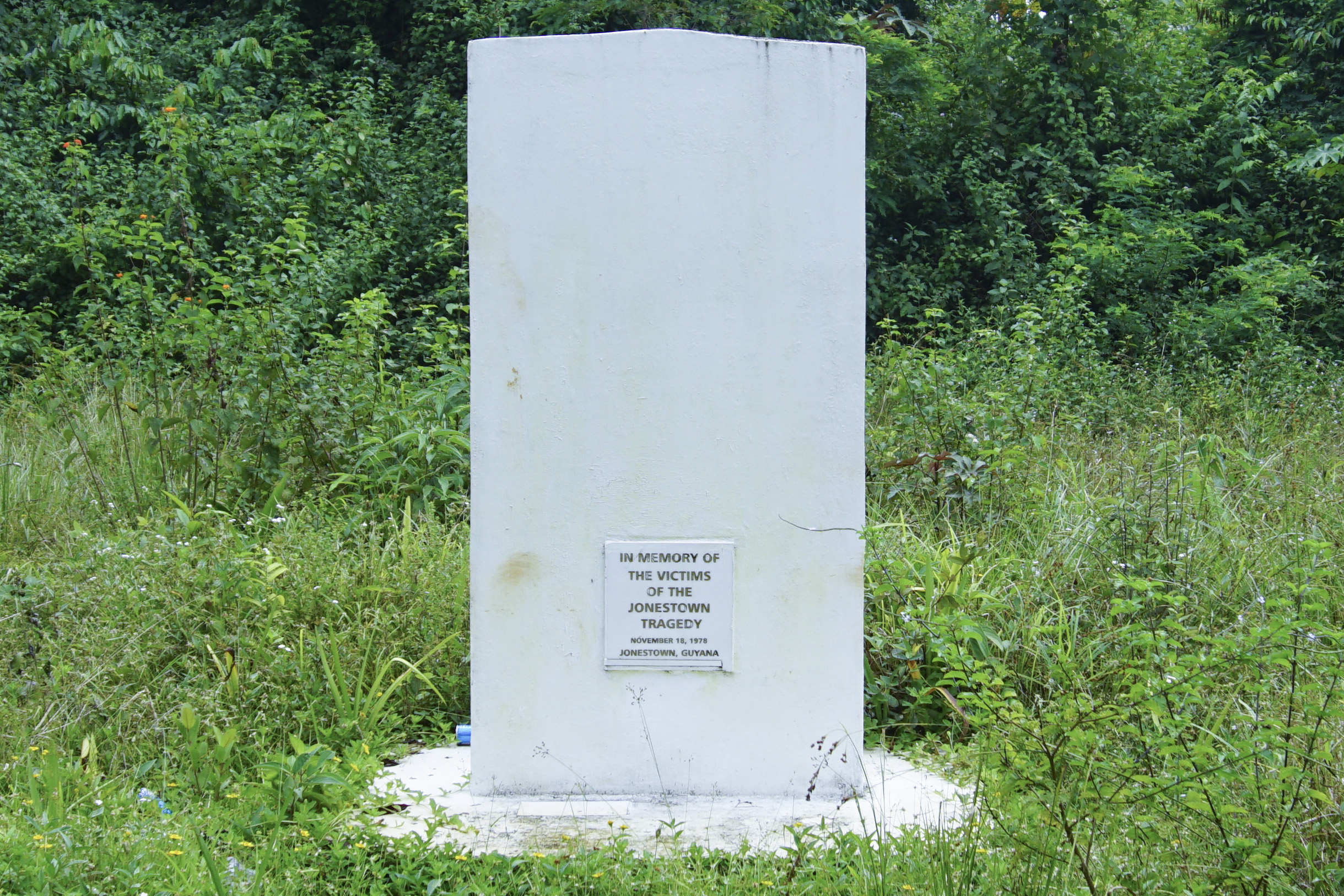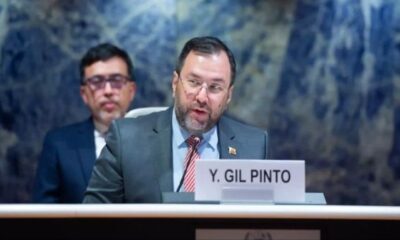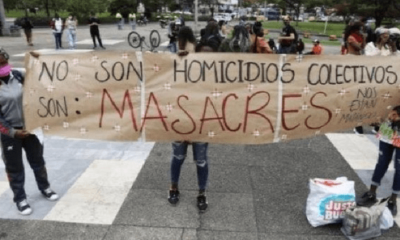International
Memory of macabre cult massacre buried in Guyana jungle

| By AFP | Patrick Fort |
Deep in the Guyanese jungle, only a signpost and a nondescript plaque serve as reminders of a cult settlement where one of the most spine-chilling mass murder-suicides in modern history took place almost five decades ago.
“Welcome to the People’s Temple,” reads the green lettering on a sign above a red dirt road announcing the entrance to what was once Jonestown, a jungle utopia-turned-nightmare, where 914 adults and children died on November 18, 1978.
They were the followers of the US reverend-guru Jim Jones, who coerced them into committing suicide, urging parents to give their children poison, while others were shot trying to flee or forced to drink the deadly liquid.
The carnage highlighted the manipulative power cult leaders wield over their followers, and those who live nearby are torn between wanting to move on and wishing the site could serve as a lesson as to what went wrong.
“There is really nothing to see, unless the place is cleared up, and you will see what remains on the ground in terms of old vehicles, tractors and other things,” said Fitz Duke, who lives in the remote nearby village of Port Kaituma.
He was 31 when the massacre occurred, and he recalls the presence of Jones and his following of poor African Americans, who worked hard to clear the jungle as they built what was meant to be a socialist, self-sufficient settlement on about 1,500 hectares in the middle of nowhere.
“They had a very good agricultural system,” Duke said, adding that local villagers would often work for the community.
“They had a lot of livestock. They were almost self-sufficient in terms of food for themselves. We used to visit often. They had a very good band, a lot of instruments,” he added.
However, while the community was billed as a non-racist, non-sexist, paradise on earth, it was run with an iron fist by Jones and his aides.
Ex-cult members made claims of drugs use, hunger and sexual enslavement, saying Jones forced his followers to work from dawn to dusk, six days a week.
“You couldn’t just come and go as you like,” said Duke.
“They had a huge tower to see directly on the main road. And they always had men up there to watch with their binoculars.”
He said Jonestown guards with “bigger guns than the police” used to search the cars, and once stopped a police car, telling them “it wasn’t Guyana, it was Jonestown.”
Hundreds ‘brainwashed’
After complaints in the United States about the living conditions in the community, Congressman Leo Ryan visited Jonestown on November 17, 1978, to investigate.
A day later, as he prepared to board a plane home, Ryan was shot dead on the tarmac by Jones’s men, who also killed three journalists and a cult member who wanted to leave.
For Jones — who had long warned his followers of a looming assault by the US government and carried out sessions in which they and their children drank fake poison — there was no turning back.
He told his followers that Ryan was a CIA agent and that US Marines were preparing to attack the community.
A 45-minute recording found near his body would later reveal how he incited his followers to commit suicide in what he said was a “revolutionary act.”
“It’s still a wonder why and how one man could have so many hundreds of people brainwashed like that,” said Duke.
Forty-four years later, only a white slab in the overgrowth bearing the words “in memory of the victims of the Jonestown massacre” bears testament to what happened at the site.
The signpost at the entrance to the community was put up to replace the old version sometime after the events.
‘A bad memory’
Duke is among those who would prefer the massacre be forgotten.
“I feel that it has done our country real, real bad. It put Guyana on the map for bad reasons. They should do away with it. They should give the land to farmers for them to cultivate it,” he said.
Local authorities did not wish to speak on the massacre.
However, opposition official in Port Kaituma, Tiffnie Daniels, 31, said she would like to see the site become a place where visitors could “understand what happened.”
“There is just a monument and the jungle. But, if children want to study that, or people want to visit as a tourist site, there is nothing,” she added.
“Yes, it’s a bad memory, but it’s also history.”
International
U.S. Senate Rejects Budget, Bringing Government Closer to Shutdown Amid DHS Dispute

The U.S. Senate voted on Thursday against a budget proposal in a move aimed at pressuring changes at the Department of Homeland Security (DHS), following the killing of two civilians during a deployment of immigration agents in Minneapolis.
All Senate Democrats and seven Republican lawmakers voted against the bill, which requires 60 votes to advance, pushing the country closer to a partial government shutdown that would cut funding for several agencies, including the Pentagon and the Department of Health.
The rejection came as Senate leaders and the White House continue negotiations on a separate funding package for DHS that would allow reforms to the agency. Proposed measures include banning Immigration and Customs Enforcement (ICE) agents from wearing face coverings and requiring them to use body-worn cameras during operations.
The vote took place just hours after President Donald Trump said he was “close” to reaching an agreement with Democrats and did not believe the federal government would face another shutdown, following last year’s record stoppage.
“I don’t think the Democrats want a shutdown either, so we’ll work in a bipartisan way to avoid it. Hopefully, there will be no government shutdown. We’re working on that right now,” Trump said during a Cabinet meeting at the White House.
International
Trump Says Putin Agreed to One-Week Halt in Attacks on Ukraine Amid Extreme Cold

U.S. President Donald Trump said on Thursday that he secured a commitment from Russian President Vladimir Putinto halt attacks against Ukraine for one week, citing extreme weather conditions affecting the region.
“Because of the extreme cold (…) I personally asked Putin not to attack Kyiv or other cities and towns for a week. And he agreed. He was very pleasant,” Trump said during a Cabinet meeting broadcast by the White House.
Trump acknowledged that several advisers had questioned the decision to make the call.
“A lot of people told me not to waste the call because they wouldn’t agree. And he accepted. And we’re very happy they did, because they don’t need missiles hitting their towns and cities,” the president said.
According to Trump, Ukrainian authorities reacted with surprise to the announcement but welcomed the possibility of a temporary ceasefire.
“It’s extraordinarily cold, record cold (…) They say they’ve never experienced cold like this,” he added.
Ukrainian President Volodymyr Zelensky later commented on the announcement, expressing hope that the agreement would be honored.
International
Storm Kristin Kills Five in Portugal, Leaves Nearly 500,000 Without Power

Storm Kristin, which battered Portugal with heavy rain and strong winds early Wednesday, has left at least five people dead, while nearly half a million residents remained without electricity as of Thursday, according to updated figures from authorities.
The revised death toll was confirmed to AFP by a spokesperson for the National Emergency and Civil Protection Authority (ANPEC). On Wednesday, the agency had reported four fatalities.
Meanwhile, E-Redes, the country’s electricity distribution network operator, said that around 450,000 customers were still without power, particularly in central Portugal.
Emergency services responded to approximately 1,500 incidents between midnight and 8:00 a.m. local time on Wednesday, as the storm caused widespread disruptions.
The Portuguese government described Kristin as an “extreme weather event” that inflicted significant damage across several regions of the country. At the height of the storm, as many as 850,000 households and institutions lost electricity during the early hours of Wednesday.
Several municipalities ordered the closure of schools, many of which remained shut on Thursday due to ongoing adverse conditions.
Ricardo Costa, regional deputy commander of the Leiria Fire Brigade, said residents continue to seek assistance as rainfall persists.
“Even though the rain is not extremely intense, it is causing extensive damage to homes,” he noted.
In Figueira da Foz, a coastal city in central Portugal, strong winds toppled a giant Ferris wheel, underscoring the severity of the storm.
-

 Central America4 days ago
Central America4 days agoGuatemala seizes over a ton of cocaine hidden in flour at Pacific port
-

 International5 days ago
International5 days agoDelcy Rodríguez seeks political agreements after Maduro’s ouster
-

 International4 days ago
International4 days agoHistoric snowstorm paralyzes Toronto after 60 centimeters of snow
-

 Central America3 days ago
Central America3 days agoGuatemala Police Arrest Prison Guard Caught in the Act of Extortion
-

 Central America3 days ago
Central America3 days agoBukele leads public trust rankings as UCA survey highlights gains in security
-

 Central America3 days ago
Central America3 days agoHonduras swears in conservative president Asfura after disputed election
-

 International4 days ago
International4 days agoSpain’s irregular migrant population rises to 840,000, study finds
-

 International5 days ago
International5 days agoFederal immigration agents kill man in Minneapolis, sparking protests and outrage
-

 International1 day ago
International1 day agoFootball Fan Killed in Clashes After Colombian League Match
-

 International3 days ago
International3 days agoWinter Storm Fern Leaves 30 Dead and Over One Million Without Power Across the U.S.
-

 Central America1 day ago
Central America1 day agoGuatemala President Says Starlink Terminal Found Inside Prison
-

 Sin categoría3 days ago
Sin categoría3 days agoEight Killed in Series of Armed Attacks in Ecuador’s Manabí Province
-

 International3 days ago
International3 days agoDoomsday clock moves to 85 seconds before midnight amid rising global risks
-

 International4 days ago
International4 days agoRights group says nearly 6,000 killed in Iran protest crackdown
-

 International1 day ago
International1 day agoMissing Spanish Sailor Rescued After 11 Days Adrift in Mediterranean
-

 International1 day ago
International1 day agoRubio Says U.S. Could Participate in Follow-Up Russia-Ukraine Talks
-

 International3 days ago
International3 days agoSpain approves plan to regularize up to 500,000 migrants in Historic Shift
-

 Sin categoría3 days ago
Sin categoría3 days agoEl Salvador Launches Fourth Year of Ocean Mission to Protect Marine Ecosystems
-

 International4 days ago
International4 days agoVenezuela frees at least 80 political prisoners, NGO says
-

 International4 days ago
International4 days agoEU launches new probe into X over AI-generated fake nude images
-

 International12 hours ago
International12 hours agoU.S. Senate Rejects Budget, Bringing Government Closer to Shutdown Amid DHS Dispute
-

 International4 days ago
International4 days agoSevere winter storm grips U.S., leaves multiple dead as extreme cold persists
-

 International4 days ago
International4 days agoFrance debates ban on social media for children under 15
-

 International12 hours ago
International12 hours agoStorm Kristin Kills Five in Portugal, Leaves Nearly 500,000 Without Power
-

 International12 hours ago
International12 hours agoTrump Says Putin Agreed to One-Week Halt in Attacks on Ukraine Amid Extreme Cold
-

 International12 hours ago
International12 hours agoMan Arrested After Vehicle Crashes Into Jewish Institution in Brooklyn






























